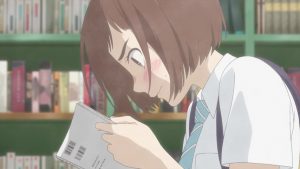 My feelings about Araburu Kisetsu no Otome-domo yo. are, in a word, complicated. I think the jury is still very much out on this series in every way – whether it will succeed in a narrative sense, what kind of message it’s trying to send, indeed whether it deserves to succeed. But it can certainly be said that it’s not boring, which is hardly a surprise given that it’s the first-ever Okada Mari double-whammy (Okada adapting Okada). There are exceptions, but generally speaking even bad Okada anime are not boring.
My feelings about Araburu Kisetsu no Otome-domo yo. are, in a word, complicated. I think the jury is still very much out on this series in every way – whether it will succeed in a narrative sense, what kind of message it’s trying to send, indeed whether it deserves to succeed. But it can certainly be said that it’s not boring, which is hardly a surprise given that it’s the first-ever Okada Mari double-whammy (Okada adapting Okada). There are exceptions, but generally speaking even bad Okada anime are not boring.
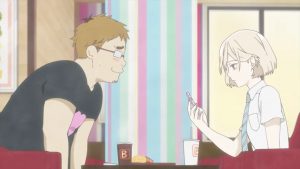 If indeed the opposite of love is indifference, this series is standing in pretty good stead. There were times during this second episode that I loved it, and times when I hated it, but I was never indifferent towards it. It’s batshit crazy for starters, with no boundaries, and it’s certainly not a bad thing to have an anime that tackles the sexual obsessions of teen girls with reckless abandon. I have no doubt that Okada is writing from authority here, even if she’s exaggerating for dramatic effect (which any writer would do, but she always does more than most). And given that so many series have neglected the perspective of girls at the expense of boys when it comes to sex, turnabout is most certainly fair play.
If indeed the opposite of love is indifference, this series is standing in pretty good stead. There were times during this second episode that I loved it, and times when I hated it, but I was never indifferent towards it. It’s batshit crazy for starters, with no boundaries, and it’s certainly not a bad thing to have an anime that tackles the sexual obsessions of teen girls with reckless abandon. I have no doubt that Okada is writing from authority here, even if she’s exaggerating for dramatic effect (which any writer would do, but she always does more than most). And given that so many series have neglected the perspective of girls at the expense of boys when it comes to sex, turnabout is most certainly fair play.
 Mind you, I’m not even sure that’s what she’s doing – but there are two sides to every story, two wrongs don’t make a right, and the best romance (though that term applies loosely here) anime have always managed to show us this topic through the perspective of both sides. Araburu scored a lot of points with me by giving us Kazusa’s internal monologue where she said “I was in the wrong. He was probably even more freaked out than I was.” I love that she’s sensitive enough to realize this, even in her current scattered state of mind.
Mind you, I’m not even sure that’s what she’s doing – but there are two sides to every story, two wrongs don’t make a right, and the best romance (though that term applies loosely here) anime have always managed to show us this topic through the perspective of both sides. Araburu scored a lot of points with me by giving us Kazusa’s internal monologue where she said “I was in the wrong. He was probably even more freaked out than I was.” I love that she’s sensitive enough to realize this, even in her current scattered state of mind.
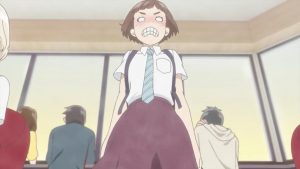 That said, it’s one thing to feel that way and quite another to act on it – which Kazusa certainly hasn’t done. Yet. And it’s still another to secretly spy on Izumi as he’s being asked out by a girl. Yes, it was Sugawara’s idea – but Kazusa still let her do it, and still watched. Worse still, she berated Izumi for no good reason after the fact. As with the “incident”, Izumi did nothing wrong here. He was approached by that girl, not the other way around. He was caught off-guard, and trying to be a nice guy and turn her down at the same time. And once again he was traumatized by Kazusa’s actions, even if that wasn’t her original intention.
That said, it’s one thing to feel that way and quite another to act on it – which Kazusa certainly hasn’t done. Yet. And it’s still another to secretly spy on Izumi as he’s being asked out by a girl. Yes, it was Sugawara’s idea – but Kazusa still let her do it, and still watched. Worse still, she berated Izumi for no good reason after the fact. As with the “incident”, Izumi did nothing wrong here. He was approached by that girl, not the other way around. He was caught off-guard, and trying to be a nice guy and turn her down at the same time. And once again he was traumatized by Kazusa’s actions, even if that wasn’t her original intention.
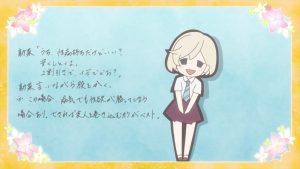 With one hand Okada gives us that really ugly scenario, then with the other she gives us Sugawara showing compassion for Izumi in his situation – acknowledging that this scenario is tough for guys, too, and that they approach their feelings differently than girls do. This whipsaw of emotion is underscored by the first scene of the episode, which shows Sugawara dealing with a scumbag and utilizing a script which (hilariously, I admit) uses Kazusa as a prop to extricate herself. Sugawara’s life story paints a really horrible picture of males – but then, there are surely young women for whom Sugawara’s story is only too familiar.
With one hand Okada gives us that really ugly scenario, then with the other she gives us Sugawara showing compassion for Izumi in his situation – acknowledging that this scenario is tough for guys, too, and that they approach their feelings differently than girls do. This whipsaw of emotion is underscored by the first scene of the episode, which shows Sugawara dealing with a scumbag and utilizing a script which (hilariously, I admit) uses Kazusa as a prop to extricate herself. Sugawara’s life story paints a really horrible picture of males – but then, there are surely young women for whom Sugawara’s story is only too familiar.
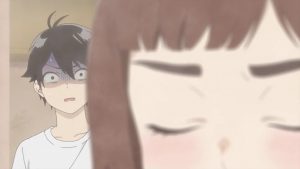 It only makes sense that Okada tackling sexual politics is going to be an explosive, schizophrenic affair. And the fact that this is all interlaced with screwball comedy makes the experience even more bewildering at times. A lot of the stuff with the literature club is really funny – that whole business with the alternative names for sex for example – but it does bely the seriousness of the larger emotional issues this series is trading in. On purpose, to be sure, and it’s effective in that sense, but we’re a long way from knowing what Okada’s real point in all this is.
It only makes sense that Okada tackling sexual politics is going to be an explosive, schizophrenic affair. And the fact that this is all interlaced with screwball comedy makes the experience even more bewildering at times. A lot of the stuff with the literature club is really funny – that whole business with the alternative names for sex for example – but it does bely the seriousness of the larger emotional issues this series is trading in. On purpose, to be sure, and it’s effective in that sense, but we’re a long way from knowing what Okada’s real point in all this is.
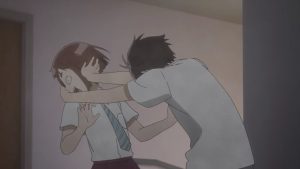 In the end, for all the lit club stuff I think it’s in the relationships that Araburu is going to stand or fall. How will things progress between Kazusa and Izumi, especially now that she’s admitted she’s in love with him? How will the likes of Sugawara and Sonezaki-san, who have hardened enmity towards males in general, deal with the increasing pull of their sexual awakening? I’m fascinated to find out if I’m honest, even if the fact that it’s Okada at the helm here fills me with trepidation. It’s rare that we see these themes dealt with so openly in anime, much less from a female point of view, so it’s certainly a plus to have this series out there. I just hope Okada-sensei doesn’t take us down too dark a path, because that would be really depressing.
In the end, for all the lit club stuff I think it’s in the relationships that Araburu is going to stand or fall. How will things progress between Kazusa and Izumi, especially now that she’s admitted she’s in love with him? How will the likes of Sugawara and Sonezaki-san, who have hardened enmity towards males in general, deal with the increasing pull of their sexual awakening? I’m fascinated to find out if I’m honest, even if the fact that it’s Okada at the helm here fills me with trepidation. It’s rare that we see these themes dealt with so openly in anime, much less from a female point of view, so it’s certainly a plus to have this series out there. I just hope Okada-sensei doesn’t take us down too dark a path, because that would be really depressing.


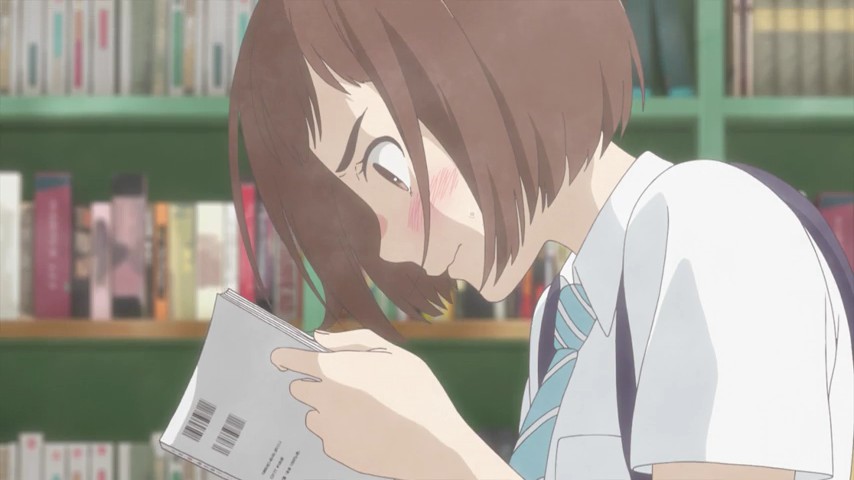
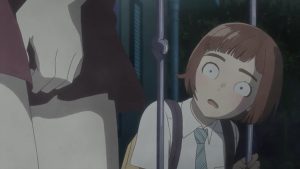
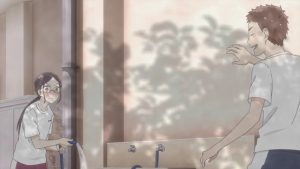
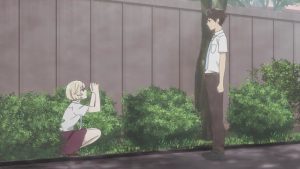
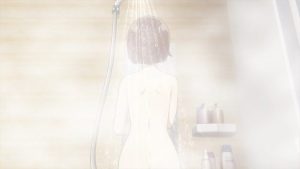
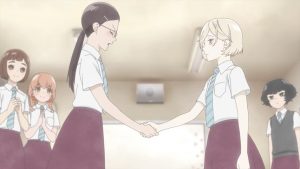
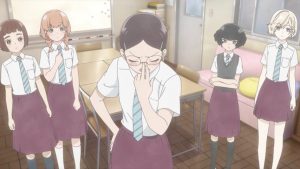
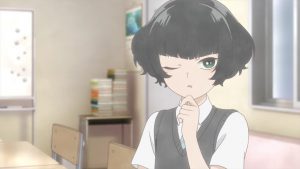

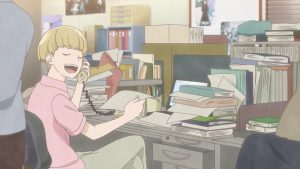
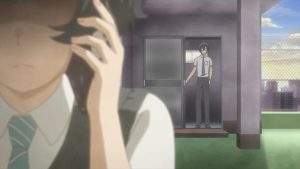
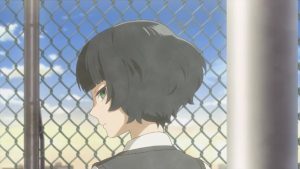
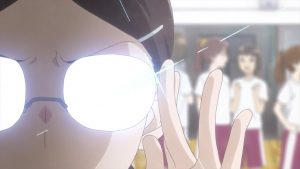
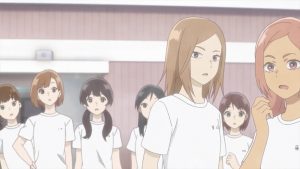
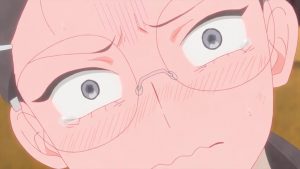


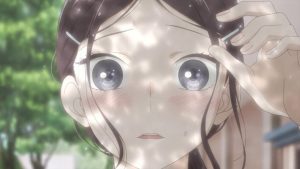
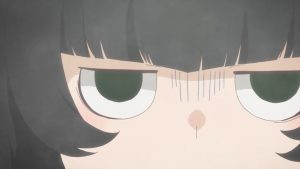
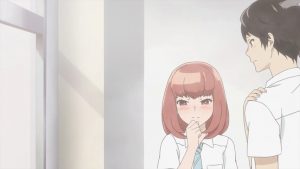

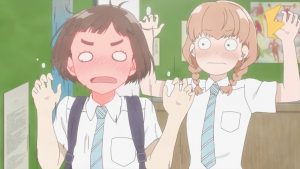


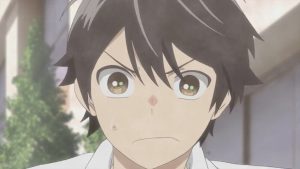


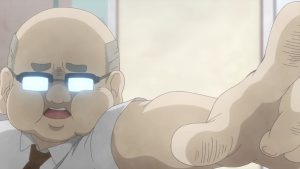



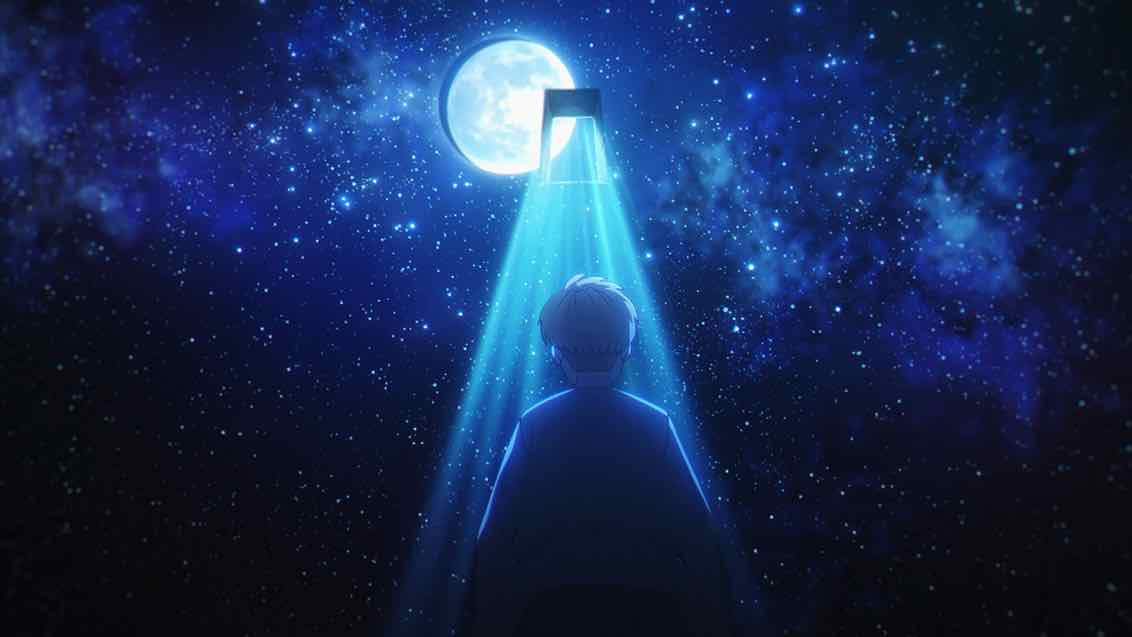

Simone
July 13, 2019 at 6:12 pmI don’t get much your reservations about the show at this point. Granted, I’m usually no fan of Okada, and I don’t like her usual brand of melodrama, but right now this is the wittiest, sharpest writing I can remember from her yet. I see why you think the whole “spying” business is wrong of course, but I just don’t see the show as endorsing that, merely giving us a bare look on the emotionally confused lives of these hormonal teenagers stumbling about in search of their own feelings. It’s entirely believable that they would fuck up more than once in the process.
sonicsenryaku
July 15, 2019 at 3:31 pmI agree with you regarding your thoughts about the show not taking a certain moral position or justifying Kasuza spying on Izumi. It doesn’t try to make Kasuza seem like she’s innocent or right for doing what she did, nor does the show condone Kasuza for asking Izumi unfair questions. However, I think the issue Enzo has, or rather the concern that he is bringing up in his write-up, is that the show seems to be trying to explore the sexual awakening of these girls at the expense of the guys (or that at least, the show lacks a fair, male perspective), ultimately making the way it handles its drama feel uninformed in a way. For me personally, I need to see more of the show before i can have any kind of solid opinion on this matter. Only time will tell; I’ll let you know in the weeks to come. Yes, the show is coming at the audience from a female perspective, but not too often in this show have we been allowed to view the males from a sympathetic light. This could make a viewer feel like the show lacks nuance in how it communicates the turbulence of sexual maturity for both males and females; and that in itself may be a bit concerning for someone who believes that a topic of this kind of delicacy should be approached from a viewpoint that equally represents both sexes’ psychological, behavioral, cognitive, and emotional complexities. A part of me sorta feels like the seemingly unfair representation of the male point of view that permeates off this show does not result from this actually being the case, but rather an inaccurate interpretation simply resulting from Okada’s decision to crank the emotional disposition of the immature teenage female point of view all the way to 11 (The melodramatic levels in Okada’s works reaching critical mass; hey, what’s new?). Incidentally, this dampens the audience’s ability to resonate with the subtle nods of sympathy Okada expresses through Izumi about young teenage boys and their sexual awakening because we as the audience are always viewing circumstances from the high-strung, neurotic frame of reference of sexually burgeoning girls. This in turn, only makes it SEEM like Okada is disregarding the emotional viewpoint and struggles of males in sexual situations and not giving that side of the equation proper treatment, when she actually isn’t. Depending on how you view the quality of araburu, Mari Okada’s other works, her ability as a writer, your mileage may vary on the legitimacy of that claim.
Now one could argue (not saying anyone here is; just bringing up claims people could formulate) that Okada’s depiction of female tribulations, specifically the scene with Sugawara and Kasuza in the early half of the episode, portrays females, particularly ones that are deemed attractive, as individuals with a bad lot in life because they are at the mercy of the lustful male gaze, creating a social paradigm where males are the predators and females are the victims who ultimately having no choice but to figure out ways to protect themselves from such gazes. The pressure of this societal disparity forces women to need to resort to self-ridicule and present themselves as diseased charlatans punished by their drive to indulge in sexual behavior just because the oppressive male gaze forces them to. It’s not exactly the most progressive way to represent people’s sexual needs, especially if the implication is that guys always seem to have sex on the mind and that females need to shame themselves to protect themselves from such predatory male behavior; but that just seems like an overly pedantic interpretation of a scene that was meant to be a silly STD joke so yea, your mileage will vary. Different strokes for different folks (sexual innuendo totally intended). While i can see strains of an arguments that could lend to a read like that, I think having a kneejerk reaction to a single scene meant to serve as a character piece/joke and being presumptive of an author’s moral and ethical intent can lead to unnecessary oversensationalizing of a person’s political and personal viewpoints. In other words, it may not necessarily be reliable to use that claim to support that Okada is being unfair to the male perspective. Again, this is a show that is being filtered through the viewpoint of young, hormonally-developing female teens. Shits bound to go sideways at some point.
That being said, I kinda wish this ep would have address that chicks masturbate too, and that rather than Kasuza asking what it would have felt like for her if Izumi had walked in on her naked, she should have asked how she would have felt if Izumi walked in on her MASTURBATING. Kasuza imagining the possibility of Izumi walking in on her naked felt so incongruous to the dilemma she was perserverating about that it almost made that section of her inner struggle feel shallow, which is a fault of the writing in that particular segment of the scene rather than the conflict itself. I guess you could argue that Kasuza’s mind wouldn’t have wondered to female masturbation, as an impulse like that might be foreign to her but….eeeeeeehhhh?? Perhaps here’s another instance where an argument could be made that Okada does not preserve an equilibrium when representing both male and female sexual turmoil in this supposed “raunchy sex comedy……” at least so far anyway. It absolutely would have been effective narratively if Kasuza put herself in Izumi’s shoes and imagined the possibility of HER masturbating; perhaps to the thought of seeing Izumi’s dick or just the idea of possibly having sex with him since she’s crushing on him so hard. That’s as sexual awakened as you can possibly get. Perhaps the show will eventually get to this point but i thought it was a missed opportunity not emphasizing that character symmetry in this episode , especially since Kasuza was attempting to empathize with Izumi by inserting herself into his mental climate
.
Another thing that i want to mention is that for a show that touts itself as being a raunchy and risque high school comedy, it actually could use a little bit more raunchiness. I also only partly agree with the notion that the script is as witty and sharp as you claim it to be Simone, but that’s because I find that the writing is a mixed bag between genuine dramatic dialogue that appropriately stages the frenetic discord of hormonally- charged teenage emotions, and portentous melodramatic yelling about how its a show about sexual awakening.That’s not to say that there is not wit to be found in the writing because there definitely is; i just think that the script is also trying too hard to be raunchy and rambunctious; and not in that “irreverent, style over substance kind of way but hahah just kidding, there’s a plenty of substance in the style type way;” it feels more like: “hey, ain’t it funny that these girls say outlandish things about their cooch and other explicitly sexual things? Look how unrestrained and witty we are. Hahahaha laugh at the joke, people; laugh.” The writing comes off as relying too heavily on the topic of sex and calling its name into existence as its template to titillate its audience, rather than having characters behaving in a raunchy manner or partaking in raunchy actions because they are slowly being tempted into doing so thanks to the plethora of hormones flowing through them.
This could be an even better show if it focused more on how the characters develop their attitudes, personalities, and cognitive schemas around sex rather than just talking about sex or fantasizing about the allure of it: there’s an important difference here. While the latter utilizes sex passively and shies from making its characters proactive participants in engaging with sexual acts: shows of this kind are more comfortable with just making jokes about sex (sometimes the characters serve to be the punchline of a sex-related joke while the consequences are ignored), talking about sex, and maybe even depicting a character in a seemingly risque sexual context, but it usually never holds the character accountable for their sexual transgressions nor does it unfurl the personal and ineffaceable compulsion or consequences of the person participating in sex-related content. The former approach however, does a better job intrinsically exploring the characters as people and treats sex more as part of their natural ecosystem, rather than a tabooed subject that is to elicit exaggerated reactions just because it’s about sex. Araburu seems to sit right between these ends; there’s more to its sexual gimmick than just the joke(more on that later) and it does a decent job with staging perverse or hormonally intense situations that affect the characters to a visible degree. That being said, araburu seems to be comfortable with handling its sexual content in an almost anecdotal, direct and puerile fashion, without holding too much value in elevating its sexual prose to something more intricately nuanced and accentuated by organic human psychology. I’m more interested in what the impulse to sex drives people to do; what cognitions or behaviors come about when they try to deny, suppress, or unleash such salacious and carnal desires. Perhaps it’s not really a flaw that the show approaches its sexual topics, or its overall narrative the way it does, but i find its methods less interesting and overly loud (though as Enzo stated, it’s not boring……at least not yet). Perhaps I’m judging too soon and need to see the series in its entirety (or at least more of it) before committing to this scope of analysis.
And why does everything in this show feel like it exists just to lead into a sex joke or pun? Yes, i get it; it’s a sex comedy. But being a sex comedy doesn’t mean everything in the show has to be about sex or lead to a sex joke every two seconds; let the characters have other things going on with them………..but ehhhhh what do i know? I’ve talked too much already. I kinda like the show; script is a mix of witty and juvenile; and while the jury is still out on the character writing, im kinda have fun with this show. Will be sticking around to see if everything comes together and my feelings for the show become stronger over time.
Collectr
July 14, 2019 at 10:40 amWhile I sympathize with your reservations about Okada Mari, let’s not forget that Ikhuhara Kunihiko – another director known for erratic series and spectacular flameouts – just gave us a crazy, original, and ultimately coherent and hopeful series in Sarazanmai. Perhaps this will be Mari’s year too – although I think more highly of some of her past work (like A Woman Called Fujiko Mine) than perhaps you do.
I understand your indignation for Izumi’s travails, but Kazusa is a girl who starts out utterly without self-awareness. She has mentally put herself firmly in the friend zone with Izumi, when, in fact, she’s in love with him. The conflict between her surface affectations and her actual feelings has knocked her off-kilter, and she is simply reacting to events and feelings that are overwhelming her. If some of those reactions seem (and are) destructive, it’s not surprising. As Christine Lavin said in her song, “Regretting What I Said…”: “Isn’t it amazing what a woman in love will do?”
I don’t know where this is going either – only one volume of the manga is available in English – but I’m prepared to go along for the ride. The writing is sharp, the characters are sympathetic, and the point of view is different. This is not cookie-cutter anime; this is not YAOI (yet another outlandish isekai). That’s enough for now.
Guardian Enzo
July 14, 2019 at 11:09 amHey, I’m certainly invested. The writing is indeed witty and sharp. And I possibly have more Okada series in my year-end Top 10# than any other writer (though I certainly haven’t counted). I’m not anti-Okada by any stretch – I just have a lot of scar tissue when it comes to this sort of material with her.
I sympathize with Kazusa being an emotional wreck, as I think I’ve made pretty clear.. My hope is that the story will show some sympathy for Izumi, as he certainly deserves it.